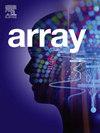Stock price prediction with attentive temporal convolution-based generative adversarial network
IF 2.3
Q2 COMPUTER SCIENCE, THEORY & METHODS
引用次数: 0
Abstract
Stock price prediction presents significant challenges owing to the highly volatile and nonlinear nature of financial markets, which are influenced by various factors including macroeconomic conditions, policy changes, and market sentiment. Traditional prediction models such as ARIMA and classic linear regression models are often inadequate for capturing the complex dynamics of stock prices. The advent of deep learning has led to substantial improvements in prediction accuracy, with various recurrent neural networks widely employed for representation learning from stock sequences. However, recurrent networks such as LSTM and GRU may exhibit susceptibility to overfitting the training data, leading to suboptimal performance in real-world predictions due to the inherent noise and volatility of stock market data. Recent research has demonstrated that temporal convolutional networks (TCN) exhibit impressive capabilities in stock price prediction. A TCN can achieve extensive sequence memory by utilizing dilated convolutions, enabling it to capture long-term dependencies in time-series data, as well as causal convolution, ensuring that the model does not utilize future information when predicting future values, which is particularly crucial for time-series prediction. Nevertheless, stock market data typically contain substantial noise to which TCNs may be overly sensitive, thereby affecting the accuracy of the predictions. To address this issue, we propose a novel stock price prediction method based on the Generative Adversarial Networks (GANs) framework, utilizing an Attentive Temporal Convolutional Network (ATCN) as the generator, termed Attentive Temporal Convolution-based Generative Adversarial Network (ATCGAN). This approach employs a GAN framework to generate stock price data using an attentive temporal convolutional network as a generator, whereas a CNN-based discriminator evaluates the authenticity of the data. Adversarial training facilitates the model’s learning of the complex distribution of stock price data. Within the GAN framework, the TCN effectively captures long-term dependencies, combined with an attention mechanism for generating representative feature combinations, thereby enhancing prediction accuracy. Compared to the traditional ARIMA forecasting method, ACTGAN achieved a 78.29% reduction in Mean Absolute Error (MAE). Furthermore, when compared to the deep learning method GRU, ACTGAN reduced the Mean Absolute Error (MAE) by 51.01%. The experimental results demonstrate that the proposed GAN-based approach significantly outperforms the traditional methods and deep learning techniques.
基于关注时间卷积的生成对抗网络的股票价格预测
由于金融市场受宏观经济状况、政策变化和市场情绪等多种因素的影响,具有高度波动性和非线性,因此股票价格预测面临重大挑战。传统的预测模型,如ARIMA和经典的线性回归模型,往往不足以捕捉股票价格的复杂动态。深度学习的出现大大提高了预测精度,各种递归神经网络被广泛应用于股票序列的表示学习。然而,像LSTM和GRU这样的循环网络可能表现出对训练数据过拟合的敏感性,由于股票市场数据固有的噪声和波动性,导致在现实世界的预测中表现不佳。最近的研究表明,时间卷积网络(TCN)在股票价格预测方面表现出令人印象深刻的能力。TCN可以通过利用扩展卷积实现广泛的序列记忆,使其能够捕获时间序列数据中的长期依赖关系,以及因果卷积,确保模型在预测未来值时不利用未来信息,这对于时间序列预测尤为重要。然而,股票市场数据通常包含大量噪声,而tcn可能对这些噪声过于敏感,从而影响预测的准确性。为了解决这一问题,我们提出了一种基于生成式对抗网络(GANs)框架的新型股票价格预测方法,利用注意时态卷积网络(ATCN)作为生成器,称为基于注意时态卷积的生成式对抗网络(ATCGAN)。该方法采用GAN框架来生成股票价格数据,使用细心的时间卷积网络作为生成器,而基于cnn的鉴别器评估数据的真实性。对抗性训练有助于模型学习股票价格数据的复杂分布。在GAN框架内,TCN有效地捕获长期依赖关系,并结合注意机制生成代表性特征组合,从而提高预测精度。与传统的ARIMA预测方法相比,ACTGAN的平均绝对误差(MAE)降低了78.29%。此外,与深度学习方法GRU相比,ACTGAN将平均绝对误差(MAE)降低了51.01%。实验结果表明,基于gan的方法明显优于传统方法和深度学习技术。
本文章由计算机程序翻译,如有差异,请以英文原文为准。
求助全文
约1分钟内获得全文
求助全文

 求助内容:
求助内容: 应助结果提醒方式:
应助结果提醒方式:


